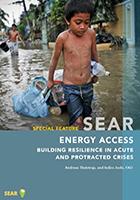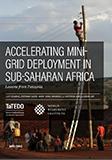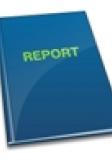Publications
Almost every month, developing countries make the headlines with stories of food and livelihood emergencies, whether driven by natural disasters, conflicts, or political instability. Take the following examples involving Sub-Saharan Africa, the Middle East, and Asia, all of which have resulted in calls for emergency humanitarian assistance since mid-2015. One thing that all of these emergencies have in common is that they magnify ongoing difficulties in accessing energy, which constitutes a key component of the physical capital required by individuals and households to pursue sustainable livelihoods. Indeed, modern energy services are essential for ensuring the well-being of people, playing a key role in providing clean water, sanitation, health care,reliable and efficient lighting, heating, cooking, mechanical power, transport, and telecommunications services (International Energy Agency 2015).
The need for energy is highly acute in displacement contexts, especially in developing countries that host large numbers of refugees or internally displaced persons (IDPs)—and the gap between the needs of growing numbers of IDPs and the resources and political will to meet these needs is increasing (Moving Energy Initiative 2015). There are currently 60 million forcibly displaced people in the world (19.5 million refugees, 38.2 million IDPs, and 1.8 million asylum-seekers)—higher than the combined populations of Australia and Canada. (UNHCR 2015). The UN Food and Agriculture Organization (FAO) is tackling these challenges by engaging in the Safe Access to Fuel and Energy (SAFE) Humanitarian Working Group—which works to facilitate a more coordinated, predictable, timely, and effective response to the fuel and energy needs of crisis-affected populations. FAO also implements projects that address both the supply and demand for fuel in multi-hazard contexts (FAOa 2013). The new emphasis is on taking a holistic approach to the multisectoral challenges, which range from natural resources (including forestry and land tenure) and climate change to nutrition, gender, protection, and livelihoods.
Thulstrup, Andreas; Joshi, Indira. 2017. Energy Access: Building Resilience in Acute and Protracted Crises. State of Electricity Access Report. Washington, D.C.: World Bank Group. http://documents.worldbank.org/curated/en/821741494927369026/Energy-access-building-resilience-in-acute-and-protracted-crises


